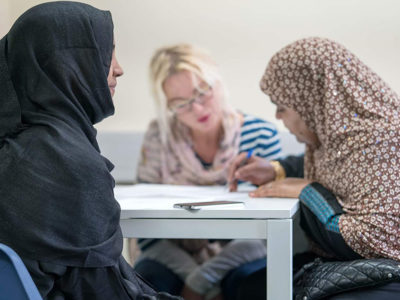Children’s rights charity director speaks to alt.cardiff
It’s a grey November afternoon in Cardiff and drizzle blurs the view from George Jones’s North Road window. A cup of tea, firmly gripped, distracts from the cold and the Assistant Director seems glad to take some time out to talk about his experiences growing up in Wales and the children’s charity he works for; Tros Gynnal Plant.
Tros Gynnal, Wales’s leading children’s rights charity, celebrates it’s tenth birthday next year and George has been with them since the start. The name literally translates as ‘for supporting children’ and the bulk of their work involves providing independent counsel to the most vulnerable children and young people in Wales.
Growing up
Having spent a tough childhood growing up in a poor slate mining community in Snowdonia, George, 55, has a special interest in the charity he works for and the children they support. However, now with a seven-year-old daughter of his own, he realises that as a child in the sixties he was faced with entirely different challenges to those facing young people in Cardiff today.
“The opportunities for my seven-year-old daughter growing up here in Cardiff are very different,” says George, remembering his childhood in Talysarn. “We were allowed to roam and get into all sorts of mischief. She wouldn’t be allowed to leave the street.”
George concedes that communities in rural Wales were, and still are, some of the poorest in the UK. Nonetheless he, along with his four brothers and sister, enjoyed all the freedoms that country life had to offer.
“Economically we were disadvantaged but in the big picture we were blessed,” said George. “My parents wouldn’t see me from break of day till late into tea time or supper time. We had an existence away from grown ups and I had a playground which spanned six mountains. It was a great time.”
Talysarn, as was the case with many villages in northwest Wales, came into existence around one of the region’s many large mines. Although, like it or not, George’s future lay elsewhere.
“My parents would never have allowed me to go down the mines,” says George, looking slightly relieved. “Because the diseases that eventually killed my father would have killed us as well.”
George’s father died from silicosis caused by slate dust on the lungs, a common problem suffered by miners in North Wales. At 66, George’s father was thought to have had a pretty good innings. “One of his major complaints was that all of his peer group had already passed away,” says George. “He’d lost all his friends because of illness or premature death for whatever reason.”
Life in Cardiff
Having left rural Wales behind, George Jones eventually arrived in Cardiff at the dawn of the new millennium, and at a time when vulnerable children in Wales were very much in the spotlight. A report by Sir Ronald Waterhouse into the widespread sexual abuse of children in Welsh care homes was published in February 2000 and uncovered one of the biggest cases of institutional child abuse ever seen.
George took up a position with the Children’s Society of England and Wales the same year but, through no fault of his own, the society moved out of Wales altogether a year later. The vacuum left in it’s absence was massive and this was quickly realised by the children, the Welsh Assembly and those who worked for the society.
“The staffing group gathered together and said; ‘we can’t just walk away from these young people’. So there was lots of discussions and anger and tears and eventually a new legal entity was established and Tros Gynall came into being into 2002.”
Now approaching their tenth birthday, Tros Gynnal has a hugely important role to play supporting vulnerable children in post-Waterhouse Wales. One of the conclusions of Waterhouse’s report was that any child being looked after by a local authority, or away from home, should have access to someone independent, an advocate. This recommendation is, in essence, why Tros Gynnal is such a significant charity in Wales.
“If a child or young person is in a position that they need to be able to say how they’re feeling, they’re able to access one of our staff,” explains George. “They will make sure that what that young person wants to say, or what that young person would like to happen, is heard by others who make those decisions about their lives.”
Reason to be cheerful
George admits that the recent recession has hit the voluntary sector hard, but seeing young people he’s helped grow into adulthood gives reason for optimism. Some children that George and his team have helped are in university, while some have gone on to work for the charity. As for George and Tros Gynnal, the next ten years look like being just as full of ups and downs as the last.
“I’ll be here for the next ten years, I think,” says George with a smile. “It’s like a roller coaster but I’m enjoying the challenge.”





